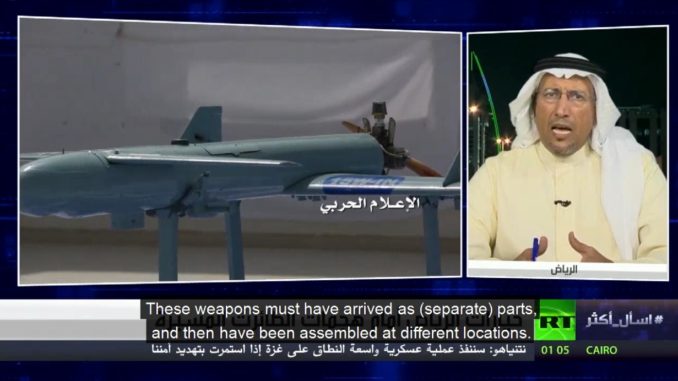
Description:
In a recent programme on RT Arabic surrounding the Yemeni crisis, Saudi political communications scholar Dr Abdullah al-Assaf said that the Houthis with their ‘very primitive minds’ could not possibly be behind the UAV and ballistic missile attacks on Saudi Arabia in recent weeks and months.
Al-Assaf said that there must be experts from Hezbollah and Iran’s IRGC present in Yemen, and that these foreign experts are the ones launching these UAV and missile attacks.
The Saudi academic also said that the Saudi-led coalition could militarily wipe out the Houthis if it really wanted to, but ‘humanitarian obstacles’ prevent it from doing so.
Source: RT Arabic (YouTube)
Date: 1 July, 2019
Transcript:
Al-Assaf:
Greetings to you, and to your guest from Sana’a. I believe that Saudi Arabia has never and will never be powerless to respond. It has many possible options for its response, as well as ways and means to deter such attacks on its civilian facilities.
Saudi Arabia today is working on many ways and means, one of which is UN Resolution 2216, which calls upon the United Nations and the Security Council to implement the terms of this Resolution.
We are aware of the Yemeni arsenal before it was seized by the Houthi militia. It did not include such weapons i.e. unmanned aerial vehicles and other missiles. How did (such weapons) reach the Houthis? Who is operating them? Who is working behind the scenes? We have no doubt that the Houthis, with their very primitive minds, cannot operate such missiles or unmanned aerial vehicles.
(Rather) there are experts from Hezbollah and the Islamic Revolutionary Guard Corps who are operating these (weapons), and this is in violation of UN Resolution 2216 that prohibits the provision of experts, equipment, expertise etc. to the Houthis.
Again we ask ourselves, how did these (weapons) get there? We must know how such weapons fell into the hands of Houthis? The Houthis cannot manufacture such advanced and sophisticated weapons. These weapons must have arrived as (separate) parts, and then have been assembled at different locations. Therefore Riyadh’s options are numerous and viable, and might be painful in my opinion if it chooses the military option to deter the Houthis.
Host:
But isn’t (Saudi Arabia) already carrying out the military option today? It has been three years since Operation Decisive Storm (was launched), yet till now Riyadh has not been able to prevent the missiles and unmanned aerial vehicles from (striking) its airports.
Al-Assaf:
These missiles and unmanned aerial vehicles are new and only started being used very recently.
Riyadh has a serious obstacle before it: the humanitarian dimension.
Riyadh acts in accordance with the norms of regular armies, the requirements of international humanitarian law, the universally accepted rules of engagement set out by the UN and international laws and treaties.
—————————————-
What would have happened if ‘Operation Decisive Storm’ was not carried out?
If Operation Decisive Storm was not carried out, Yemen would have been today a carbon copy of Syria; we would see today terrorist groups such as Daesh, al-Qaeda and others – in addition to the Houthi militia – in Yemen; and Iran would have been able to extend its influence over the Bab el-Mandeb Strait, in addition to the Strait of Hormuz, (in which case Iran) would no longer require a nuclear weapon to negotiate, and it could force the world to yield to its demands.
We do not see any Yemeni expatriates or migrants. Today, Yemen is better than the past, due to the humanitarian aid (going in), due to ‘Operation Restoring Hope’, the demining (efforts) and many other things. Yemen has been assured and looks forward to becoming a happy Yemen once this (Houthi/Ansarullah) gang comes to an end.
Regarding what you asked me before as to whether the coalition has achieved anything or not – yes, today the coalition has achieved more than 85% (of its goals). Yet the problem is that we’re not dealing with a regular army, but rather with a gang that takes cover behind civilians and uses them as human shields. This humanitarian dimension is very important. Today, we are able to carry out a very comprehensive military action that can eliminate the Houthis, but this would incur great losses on both sides, for (both) the (Saudi-led) coalition and the Yemenis.
In any war, there are innocent (people that die), but the coalition is using smart weapons. As acknowledged by the United Nations, the coalition aborted more than 15,000 (airstrikes) just because it may strike civilians (in the process), unlike the (Houthi/Ansarullah) gang which uses inaccurate weapons to target civilians because it thinks that this would spread panic and fear among them. Actually, this doesn’t frighten (our civilians), as far as we’re concerned these (attacks on us) are nothing but fireworks. We stand by our government until the elimination of the last terrorist militia in the southern region, God willing.

Leave a Reply